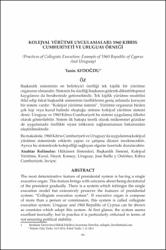| dc.contributor.author | Aydoğdu, Yasin | |
| dc.date.accessioned | 2020-06-25T14:40:55Z | |
| dc.date.available | 2020-06-25T14:40:55Z | |
| dc.date.issued | 2014 | |
| dc.identifier.citation | Aydoğdu, Y. (2014). Kolejyal yürütme uygulamaları: 1960 Kıbrıs Cumhuriyeti ve Uruguay örneği. UYUŞMAZLIK MAHKEMESİ DERGİSİ, 1(4), 93 - 113. | en_US |
| dc.identifier.issn | 2147-8376 | |
| dc.identifier.issn | 2149-7966 | |
| dc.identifier.uri | https://app.trdizin.gov.tr/publication/paper/detail/TVRZM09UVTNOdz09 | |
| dc.identifier.uri | https://hdl.handle.net/20.500.12587/653 | |
| dc.description.abstract | Başkanlık sisteminin en belirleyici özelliği tek kişilik bir yürütme organının olmasıdır. Sistemin bu özelliği başkanın giderek diktatörleşmesi kaygılarını da beraberinde getirmektedir. Tek kişilik yürütme modelini ihlal edip fakat başkanlık sisteminin özelliklerini geniş anlamda koruyan bir sistem vardır: “Kolejyal yürütme sistemi”. Yürütme organının birden çok kişi veya kurul halinde oluştuğu sisteme kolejyal yürütme sistemi denir. Uruguay ve 1960 Kıbrıs Cumhuriyeti bu sistemi uygulamış ülkeler olarak gösterilebilir. Sistem ilk bakışta teorik olarak mükemmel gözükse de uygulamada özellikle siyasi istikrarın sağlanamaması bakımından eleştirilmektedir. Bu makalede, 1960 Kıbrıs Cumhuriyeti ve Uruguay’da uygulanmış kolejyal yürütme sisteminde erklerin yapısı ve çalışma düzeni incelenecektir. Ayrıca bu sistemlerde kolejyalliği sağlayan olgular üzerinde durulacaktır. | en_US |
| dc.description.abstract | The most determinative feature of presidental system is having a single executive organ. This feature brings with concerns about being dectatorial of the president gradually. There is a system which infringes the single execution model but extensively preserve the features of presidental system: “Collegiate execution system“. If executive organ is compose of more than a person or commission, this system is called collegiate execution system. Uruguay and 1960 Republic of Cyprus can be shown as countries which adopt this system. At first glance, the system seems excellent teorically; but in practice it is particularly criticised in terms of not ensuring political stability. In this article, structure and working order of the powers in collegial execution system which is practised in Uruguay and 1960 Republic of Cyprus, will be analysed. In addition, events which enable collegiatelity in this system will be emphasized. | en_US |
| dc.language.iso | tur | en_US |
| dc.rights | info:eu-repo/semantics/openAccess | en_US |
| dc.subject | Hukuk | en_US |
| dc.title | Kolejyal yürütme uygulamaları: 1960 Kıbrıs Cumhuriyeti ve Uruguay örneği | en_US |
| dc.title.alternative | Practices of collegiate example of 1960 republic Cyprus and Uruguay | en_US |
| dc.type | article | en_US |
| dc.contributor.department | Kırıkkale Üniversitesi | en_US |
| dc.identifier.volume | 1 | en_US |
| dc.identifier.issue | 4 | en_US |
| dc.identifier.startpage | 93 | en_US |
| dc.identifier.endpage | 113 | en_US |
| dc.relation.journal | UYUŞMAZLIK MAHKEMESİ DERGİSİ | en_US |
| dc.relation.publicationcategory | Makale - Ulusal Hakemli Dergi - Kurum Öğretim Elemanı | en_US |
















